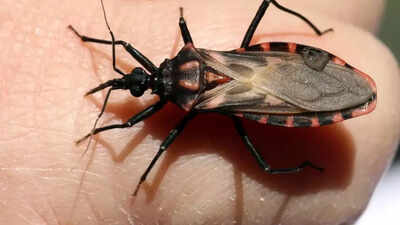Heads up, the bugs are here!There’s a tiny but mighty threat silently crawling into our lives: the kissing bugs. These blood-sucking insects are spreading across the United States of America, and carrying a sneaky parasite called Trypanosoma cruzi, the culprit behind Chagas disease. Often overlooked, this disease can lead to serious cardiac and intestinal troubles down the line.The CDC now reports kissing bugs in 32 states, and human cases have popped up in several, including California and Texas.
Kissing bugs and Chagas: What’s going on?
Chagas disease, also known as American trypanosomiasis, is caused by the parasite T. cruzi, typically transmitted when an infected kissing bug bites and then defecates near the entrance site. If you accidentally rub feces into the bite, eyes, or mouth, the parasite can sneak in. Symptoms in the early (acute) stage are often mild or unnoticeable; think fever, fatigue, headache, or eyelid swelling (the hallmark “Romaña’s sign”). But many cases go undiagnosed until the chronic phase, years later, when a frightening 20–30% can develop serious heart problems like heart failure or arrhythmias, or digestive issues. Antiparasitic treatments exist, but they’re most effective early on.
Which US states are affected?
Kissing bugs (scientists call them triatomine insects) have now been reported across 32 states, with human cases confirmed in eight, including California, Texas, Arizona, Louisiana, Missouri, Mississippi, Arkansas, and Tennessee. In California, most sightings happen in the Sierra Nevada foothills, Los Angeles, and San Diego deserts, where wild mammals (opossums, raccoons, rats) thrive.
Key pointers:32 states have documented kissing bugs.Human infections confirmed in at least eight states: California, Texas, Arizona, Louisiana, Tennessee, Missouri, Mississippi, and Arkansas.California: Especially bugs in Southern California are carrying T. cruzi, with infections noted in Los Angeles and San Diego counties.Texas: The state has become a hotspot, with 50 locally acquired human cases (2013-2023), dogs in certain kennels showing up to 31% infection rates, and kissing bugs testing positive in 30-50% of samples.Southern states in general: Due to abundant wildlife and suitable ecological conditions, these states are seeing more kissing bug activity. Wildlife like raccoons, opossums, armadillos, and others help sustain the parasite cycle.
How does Chagas disease spread?
A kissing bug bites, often around the face, and then drops infected feces near the wound. If you scratch or touch it, the dangerous parasite Trypanosoma cruzi enters your body. It can also spread via contaminated blood, organ transplants, or mother-to-baby transmission.
Symptoms to watch out for
Chagas has two phases:Acute phase: Often mild or unnoticed. Could include fever, fatigue, headache, vomiting, or eyelid swelling. Chronic phase: May take decades to develop. Serious heart trouble (like heart failure or arrhythmias), enlarged digestive organs, and nerve issues. Drug treatments work only in the early stages.
What can you do to protect yourself?
Identify the culprit: Kissing bugs are flat, dark brown or black, often with red, orange, or yellow stripes or solid lighter shades around their edges. They have a pointed, cone-shaped head and long, thin legs.Fortify your home: Seal cracks and crevices around doors, windows, and walls. Install sturdy screens and keep outdoor lighting to a minimum at night. Keep pet sleeping areas clean; bugs often get in via dirty or pet-filled spaces.Handle bugs safely: Never touch kissing bugs with your bare hands. Instead, trap them carefully using gloves and a container, and then contact local health or pest control authorities.Monitor symptoms and get tested: If you experience unexplained fever, fatigue, swollen eyelids, or other unusual signs, especially if bitten by a bug, see a doctor and ask about Chagas. Blood tests can confirm infection; early antiparasitic treatment (like benznidazole or nifurtimox) can clear the parasite if caught early.Protect pets and loved ones: Pregnant women or those receiving blood transfusions should be extra cautious, as Chagas disease can be transmitted congenitally or through contaminated blood/organs. Additionally, dogs are common victims, especially in kennels, and can even become reservoirs, passing the parasite back into the bug population.


